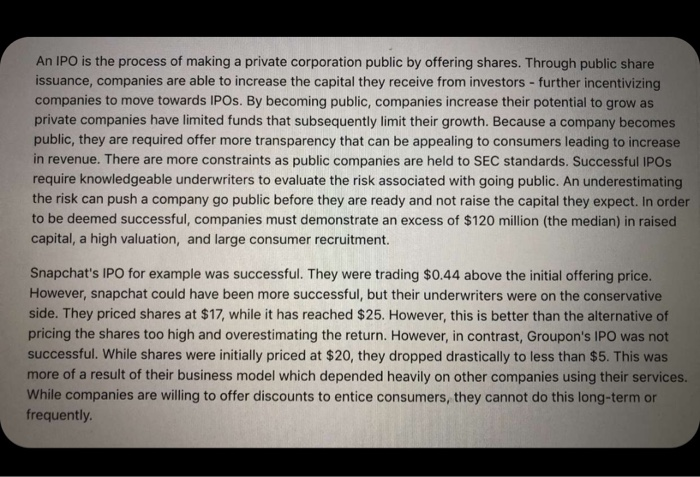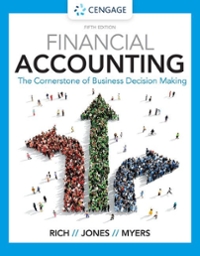An IPO is the process of making a private corporation public by offering shares. Through public share issuance, companies are able to increase the capital they receive from investors - further incentivizing companies to move towards IPOs. By becoming public, companies increase their potential to grow as private companies have limited funds that subsequently limit their growth. Because a company becomes public, they are required offer more transparency that can be appealing to consumers leading to increase in revenue. There are more constraints as public companies are held to SEC standards. Successful IPOs require knowledgeable underwriters to evaluate the risk associated with going public. An underestimating the risk can push a company go public before they are ready and not raise the capital they expect. In order to be deemed successful, companies must demonstrate an excess of $120 million (the median) in raised capital, a high valuation, and large consumer recruitment. Snapchat's IPO for example was successful. They were trading $0.44 above the initial offering price. However, snapchat could have been more successful, but their underwriters were on the conservative side. They priced shares at $17, while it has reached $25. However, this is better than the alternative of pricing the shares too high and overestimating the return. However, in contrast, Groupon's IPO was not successful. While shares were initially priced at $20, they dropped drastically to less than $5. This was more of a result of their business model which depended heavily on other companies using their services. While companies are willing to offer discounts to entice consumers, they cannot do this long-term or frequently An IPO is the process of making a private corporation public by offering shares. Through public share issuance, companies are able to increase the capital they receive from investors - further incentivizing companies to move towards IPOs. By becoming public, companies increase their potential to grow as private companies have limited funds that subsequently limit their growth. Because a company becomes public, they are required offer more transparency that can be appealing to consumers leading to increase in revenue. There are more constraints as public companies are held to SEC standards. Successful IPOs require knowledgeable underwriters to evaluate the risk associated with going public. An underestimating the risk can push a company go public before they are ready and not raise the capital they expect. In order to be deemed successful, companies must demonstrate an excess of $120 million (the median) in raised capital, a high valuation, and large consumer recruitment. Snapchat's IPO for example was successful. They were trading $0.44 above the initial offering price. However, snapchat could have been more successful, but their underwriters were on the conservative side. They priced shares at $17, while it has reached $25. However, this is better than the alternative of pricing the shares too high and overestimating the return. However, in contrast, Groupon's IPO was not successful. While shares were initially priced at $20, they dropped drastically to less than $5. This was more of a result of their business model which depended heavily on other companies using their services. While companies are willing to offer discounts to entice consumers, they cannot do this long-term or frequently







